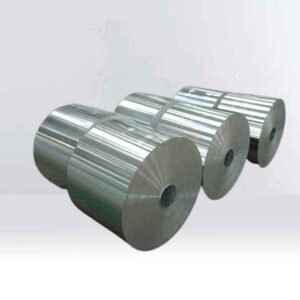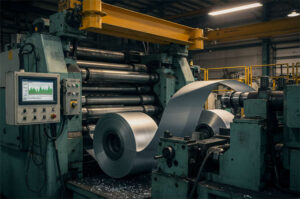In the bustling world of manufacturing, few materials stand out as much as aluminum foil. It’s a staple in households and industries across the globe, prized for its versatility, durability, and eco-friendly properties. At Yutwin Aluminum Foil, we take immense pride in being at the forefront of aluminum foil production. Our journey spans decades of innovation, and we’ve honed our craft to perfection, ensuring that every roll of aluminum foil we produce meets the highest standards of quality and performance. In this blog post, we’ll delve into the intricate and fascinating process of how aluminum foil is made, shedding light on the precision and expertise that goes into crafting this everyday miracle. So, buckle up and join us as we embark on a journey from raw materials to the final product that you trust and use daily.
The creation of aluminum foil is a testament to human ingenuity and technological advancement. It’s not just about transforming aluminum into thin sheets; it’s about maintaining exacting standards throughout the entire production cycle. From the careful selection of raw materials to the precise control of temperatures during casting and rolling, every step is meticulously executed. At Yutwin Aluminum Foil, our state-of-the-art facilities and a team of dedicated professionals ensure that no detail is overlooked. We understand that our customers rely on our products for a myriad of applications, and it’s our mission to deliver aluminum foil that consistently exceeds expectations. As we delve into the production process in depth, you’ll gain a newfound appreciation for the complexity and precision involved in providing you with the aluminum foil that has become an indispensable part of modern life. Stay with us as we unravel the secrets behind the thin, silvery sheets that encapsulate our food, power our devices, and serve countless industrial purposes.
This blog post has provided you with valuable insights into the world of aluminum foil production. At Yutwin Aluminum Foil, we’re not just manufacturers; we’re storytellers of a material that weaves its way through the fabric of our daily lives. From the packaging of your favorite snacks to the advanced applications in batteries and capacitors, the journey of aluminum foil is one of transformation and purpose.
At Yutwin Aluminum Foil, we take pride in a manufacturing process that is both complex and precise. We combine state-of-the-art technology with decades of expertise to transform raw aluminum into high-quality, versatile foil products used by industries across the globe.
Here’s an inside look at how aluminum foil is manufactured in our state-of-the-art facilities.
The Yutwin Aluminum Foil Manufacturing Process
Step 1: Raw Material Preparation
We begin our process with high-purity raw materials. Our primary source is electrolytic aluminum liquid with a purity of at least 99.7%. We also utilize remelted aluminum ingots with a purity of 99.5%. To create specialized alloys, we introduce specific elements. For example, to produce our durable 3003 series foil, we add manganese. For our high-performance 7072 series foil, we incorporate elements like zinc, magnesium, and copper to enhance its properties.
Step 2: Smelting and Casting
We place the prepared raw materials into a smelting furnace, where we maintain a precise temperature of around 700°C (1292°F). During this critical stage, we introduce refining agents, such as chloride and fluoride salts. These agents purify the molten aluminum by removing oxidized compounds and dissolved gases.
After the smelting and refining, we transfer the purified molten aluminum into a casting machine. Here, it cools and solidifies into large aluminum slabs, typically ranging in thickness from 50 mm to 300 mm.
Step 3: Hot Rolling
We heat the aluminum slabs to a temperature between 480°C and 500°C (896°F – 932°F) and feed them into our powerful hot rolling mills. This process progressively reduces the slab’s thickness to approximately 3-5mm. Hot rolling is crucial for eliminating casting defects and refining the material’s internal grain structure, thereby preparing it for the next stage.
Step 4: Cold Rolling
After hot rolling, we treat the aluminum coils in an acid bath to clean and remove any surface oxidation. The coils then move to the cold rolling stage, which we perform at room temperature. We pass the aluminum through the cold rolling mills multiple times, further thinning it to a thickness between 0.006 mm and 0.2 mm. While cold rolling increases the foil’s hardness and strength, it also reduces its plasticity. To restore flexibility, we perform intermediate annealing, a heat treatment process that eliminates work hardening.
Step 5: Finishing Rolling
Le présent is the most precise and demanding step in the production of aluminum foil. Our finishing mills operate with extreme accuracy, achieving thickness tolerances as tight as ±0.001 mm and sometimes even tighter. Through this precision rolling, we ensure that the final foil meets exact specifications for thickness, width, and flatness while also refining its surface quality and mechanical performance.
Step 6: Annealing
We place the finished-gauge foil into a large annealing furnace. Here, we heat the foil, hold it at a specific temperature, and then slowly cool it. The annealing temperature typically ranges from 200°C to 350°C (392°F – 662°F), with the duration depending on the foil’s thickness and intended final properties. This process relieves any residual stress from rolling, enhances ductility and flexibility, and optimizes the foil for its end-use.
Step 7: Surface Treatment and Finishing
The rolling process can sometimes leave minor surface imperfections. To ensure a flawless product, we perform various surface treatments, including precision slitting, polishing, and brushing. For specialized applications, we also offer advanced finishing services, including coating, laminating, printing, and custom slitting.
Step 8: Final Inspection and Packaging
Our dedicated quality assurance team conducts a rigorous final inspection on every batch of foil, verifying its appearance, dimensions, and physical properties against our strict standards. Once approved, we package the foil according to customer specifications using cartons, wooden boxes, or plastic film to ensure it arrives in perfect condition, ready for shipment and sale.
What Additives Do We Use in Aluminum Smelting?
To guarantee the highest quality, we introduce specific additives during the smelting stage.
- Refining Agents: We use agents like sodium chloride and potassium chloride to remove gases and non-metallic impurities (like alumina) from the molten aluminum. They form a protective layer that also absorbs contaminants, which we then remove as slag.
- Covering and Slagging Agents: Covering agents insulate the molten aluminum and prevent oxidation from occurring. We then use slagging agents, such as mixtures of sodium and potassium sulfate, to efficiently remove surface dross.
- Alloying Elements: We add precise amounts of elements, such as manganese, zinc, magnesium, and copper, to create alloys with specific characteristics, including enhanced strength, corrosion resistance, or formability.
- Antioxidants: We incorporate these to minimize material loss due to oxidation during the high-temperature smelting process, thereby improving our yield and overall quality.
- Grain Refiners & Modifiers: We use grain refiners to create a finer, more uniform crystalline structure, which improves the foil’s mechanical properties. Modifiers help alter the shape of impurities, further enhancing the quality of the final product.
How Thin Can We Make Aluminum Foil?
At Yutwin Aluminum Foil, our advanced manufacturing technology allows us to produce foil at an incredible minimum thickness of just 0.004 mm (4 microns). The ideal thickness depends on the application:
- Packaging Industry: Typical packaging foil ranges from 0.006 mm to 0.2 mm. We produce foil as thin as 6-10 microns for candy wrappers and 10-20 microns for chocolate. Heavier-duty food packaging for grilling or freezer storage is usually 30-50 microns thick.
- Battery Industry: For the positive electrode in lithium-ion batteries, we manufacture foil between 10 and 20 microns thick. Our advanced smart factories can now mass-produce ultra-thin battery foil at just 9 microns.
- Capacitor Industry: This sector requires fragile foil, which we produce in a range of 6 to 12 microns.
What is the Annealing Temperature for Our Aluminum Foil?
We customize the annealing temperature and time to meet the exact requirements of each product.
- General-Purpose Packaging Foil: We typically anneal this foil between 260°C and 490°C (500°F – 914°F). For ultra-thin foils (under 0.01 mm), we use a more controlled range of 290°C to 310°C (554°F to 590°F).
- Battery Foil: Foil for lithium-ion batteries requires annealing between 350°C and 450°C (662°F – 842°F).
- Capacitor Foil: To achieve the high-performance properties required for capacitors, we anneal the foil between 425°C and 500°C (797°F – 932°F) for up to 15 hours.
- Double-Zero Foil Stock: This material undergoes a homogenization anneal at a high temperature, generally between 560°C and 580°C (1040°F – 1076°F).
- High-Purity Foil: For specialty applications, we use precise annealing cycles at temperatures up to 500°C (932°F) for 15 hours.
Our commitment to excellence is reflected in every stage of production. The meticulous selection of raw materials, the precision of casting and rolling temperatures, and the stringent quality control measures all contribute to the superior aluminum foil that we’re proud to offer. We understand that our customers have diverse needs, which is why we continually innovate and expand our product range. Whether you’re looking for standard household aluminum foil or specialized industrial-grade foil, Yutwin Aluminum Foil has got you covered.
As we’ve explored the various aspects of aluminum foil production, from the initial molten stages to the final packaged product, it’s clear that this seemingly simple material is the result of complex processes and unwavering dedication. We invite you to visit our website to learn more about our extensive product line and the exceptional services we offer. If you need custom solutions or have specific inquiries, don’t hesitate to reach out to our customer service team. We’re here to ensure that your aluminum foil needs are met with the same precision and care that goes into every roll we produce. After all, at Feuilles d'aluminium Yutwin, we don’t just make aluminum foil; we craft possibilities. Thank you for joining us on this enlightening journey.We look forward to serving you with the finest aluminum foil solutions.























